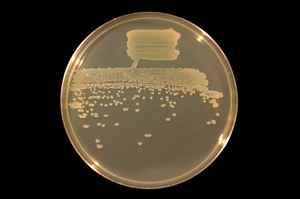10 February 2015. Pfenex Inc., a biotechnology company in San Diego, is licensing its lead product to treat age-related macular degeneration to biologic therapy maker Hospira. The deal can bring Pfenex as much as $342 million, plus royalties on sales of products from the collaboration, over at least the next five years.
Age-related macular degeneration is a common eye disorder, where damage to the macula, a small spot in the center of the retina, becomes damaged, resulting in progressive loss of vision. Over time, central vision becomes blurred and grows, disrupting the ability to read, drive, work, or recognize faces. The disorder is most common in older individuals, and a leading cause of vision loss among people age 50 and older.
Pfenex’s lead product is a biologic therapy for the neovascular or “wet” form of macular degeneration, where abnormal blood vessels grow underneath the retina that can leak and quickly lead to swelling and damage of the macula. The product, code-named PF582, is an engineered protein designed to work similarly to ranibizumab, an engineered biologic injected into the eye that blocks actions of vascular endothelial growth factors, signaling proteins promoting development and leakage of blood vessels.
Ranibizumab is marketed by Genentech, a subsidiary of drug maker Roche, as Lucentis. Pfenex and Hospira estimate the worldwide market for Lucentis at about $4 billion, and the overall market for biologics targeting vascular endothelial growth factors in the eyes at $6.7 billion.
Pfenex’s technology uses genetically engineered Pseudomonas fluorescens bacteria that are largely benign, found in soil and water, and used in agriculture, antibiotics, and production of yogurt. At Pfenex, the bacteria are modified from a library of genetic elements into strains with specific genetic properties, then grown to screen for potential therapeutics. The technology, says Pfenex, is faster and more systematic than traditional trial-and-error drug discovery processes.
PF582 is currently in an intermediate stage clinical trial with a sample of 24 patients randomly assigned to receive three doses of PF582 or Lucentis, testing for equivalence with Lucentis. Under the agreement, Hospira receives an exclusive license to develop and commercialize PF582 worldwide, with the two companies sharing the costs of late-stage equivalence trials.
Hospira is providing Pfenex with an initial $51 million payment, with Pfenex eligible for future development and sales milestones of up to $291 million. In addition, Pfenex qualifies for royalties on sales of products developed from the partnership.
Hospira, in Lake Forest, Illinois, specializes in injectable drugs, as well as biologics designed to work similarly to name-brand biologics, also known as biosimilars. Last week, Hospira agreed to acquisition of the company by drug maker Pfizer, in a deal valued at $17 billion.
Read more:
- Zymeworks, Celgene to Develop Double-Binding Antibodies
- Neuropore, UCB Partner on Parkinson’s Drugs
- Amgen, Kite Pharma Partner on Personal Cancer Immunotherapy
- Lilly, Biotech Partner on Fast-Acting Insulin Analog
- Pfizer, Opko Partner on Growth Hormone Drug
* * *


 RSS - Posts
RSS - Posts
You must be logged in to post a comment.